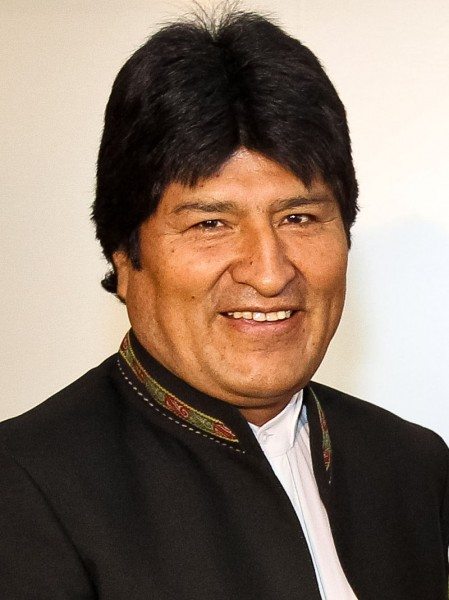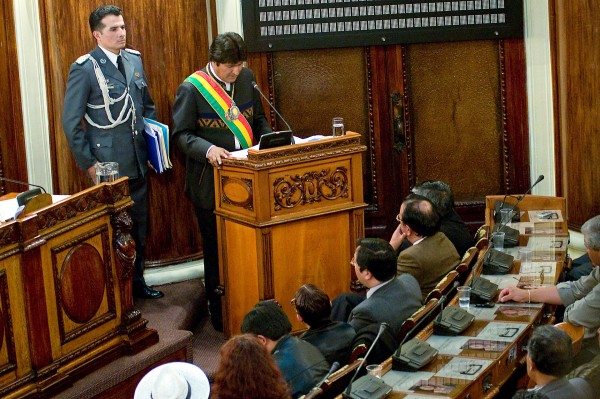Mikhail Bakunin is believed to have said, “If you took the most ardent revolutionary, vested him in absolute power, within a year he would be worse than the Tsar himself.” The influential anarchist thinker was merely articulating a distinction between his anti-statist brand of libertarian socialism and the “dictatorship of the proletariat” prescription by Karl Marx, which would be used as a justification for a one-party system by Marxist-Leninist dictatorships to come. While the wording of Bakunin’s injunction may be original, its meaning echoes a truism famously propounded by Lord Acton, and shared by political philosophers since time immemorial.
Perhaps this is what was running through Evo Morales’ mind when, after winning a third term to the Bolivian presidency on Sunday —which an earlier court ruling had decided wasn’t technically a violation of the Bolivian constitution’s two-term limit— the self-styled “communitarian socialist” president promptly assured his compatriots (and the world) that he would not seek a fourth term. While anyone with the tiniest affinity for liberty and democracy should hope that Morales is a man of his word, history provides plenty of reason to doubt.
The past 100 years are brimming with Marxist movements that devolved into cult worship once iron-fisted men gained power. Of the countries wherein the religion of state socialism has reared its snarling head —Stalin’s Russia; Mao’s China; the North Korea of Papa Kim, Baby Kim and Baby Kim, Jr.; Cuba of los hermanos Castro; Ortega’s Nicaragua; and Chávez & Co.’s Venezuela; just to name a few— only Russia has at least nominally returned to something even resembling democracy, though the crucible of modern communism still suffers under a one-man system.
Plus, Morales has proven himself to be a young, flamboyant leader, with a vague fidelity to socialist principles and an even vaguer plan for setting the Bolivian people on a path toward future progress. Until now, all he’s manages to accomplish is tread down the road trampled by starry-eyed caudillos before him: he’s nationalized industries and resources, spent the new money on the discontented poor, and thrown mud in Uncle Sam’s eye. Castro did it, and so did Chávez.
The problem with that strategy, however —as most Cubans and the Venezuelans will dolefully tell you— is that it can quickly degenerate into a situation in which political stability comes to rely on a central figure, vested with a sweeping mandate and backed by a fawning public that supports him (or possibly her) merely as long as the head honcho commits to high, sustained levels of social spending. Meanwhile, state socialism (an oxymoron) imposes tight controls on the national economy, mirroring state capitalism by placing well-meaning government officials in the roles formerly held by neoliberal plutocrats. Inevitably, the economic system financing the regime’s generous social agenda begins to implode, and the people begin viewing the new regime in the same way they viewed the old one: as being either unable or unwilling to respond to the needs of the people.
Once the protests start —as they have already in Bolivia, even within Morales’ own indigenous base— the government will be tempted to utilize repressive tactics to preserve order and maintain its control. The beloved leader will in turn be tempted to extend his presidency as to steer the country through its turbulence, guiding the people with his steady (despotic) hand. After a while, the people become his people, in his mind. Thus, Acton.
That’s what made General Washington a godsend for America and what makes Comandante Castro a villain for Cuba. The first won a revolution, became the father of his country by leading the budding nation through its first steps, and then relinquished the great project over to the people; the other also won a revolution, but seized power for himself, holding on to that power until he couldn’t hold it any longer, and then, nearly five decades later, passed it off to his brother.
In addition to passing the torch at the end of his third term, Morales should pursue other courses of action to ensure Bolivia’s leftist program (and Latin America’s) is safe for at least the foreseeable future. As Ellie Mae O’Hagan writes for the Guardian:
Morales must make reducing the number of child workers a priority during his third term. Not doing so will be a serious failure of his progressive project. In terms of social reforms, Morales should heed recent calls from the public advocate of Bolivia, Rolando Villena, to legalise same-sex civil unions and pave the way for equal marriage. He should also follow the lead of Uruguay’s president, José Mujica, and completely liberalise abortion, which would be a good first step to tackling the country’s high rates of maternal mortality. And Morales must also address the criticism of indigenous leaders who accuse him of failing to honour his commitments to protect indigenous people and the environment.
It isn’t only Morales’ personal legacy that’s at stake or the legacy of Bolivia’s leftist movement. The fate of Latin American leftism may ride on what Morales decides to do from here on out. As it stands, the viability of socialism in Latin Americas is already being reduced by the power-mongering that continues to take place in Cuba, Venezuela, Nicaragua and Ecuador—not to mention the current retreat toward the center by Brazil’s Partido dos Trabalhadores, historically one of the region’s preeminent leftist groups. In this part of the world, where a pink tide has recently claimed more than half a dozen countries, Morales’ inability to present leftist policies —especially socialism— as a functional and liberating alternative to neoliberalism could keep leftist movements from gaining power in other countries, and would make leftism much tougher to pitch in the future.
***
Hector Luis Alamo is a Chicago-based writer. You can connect with him @HectorLuisAlamo.




